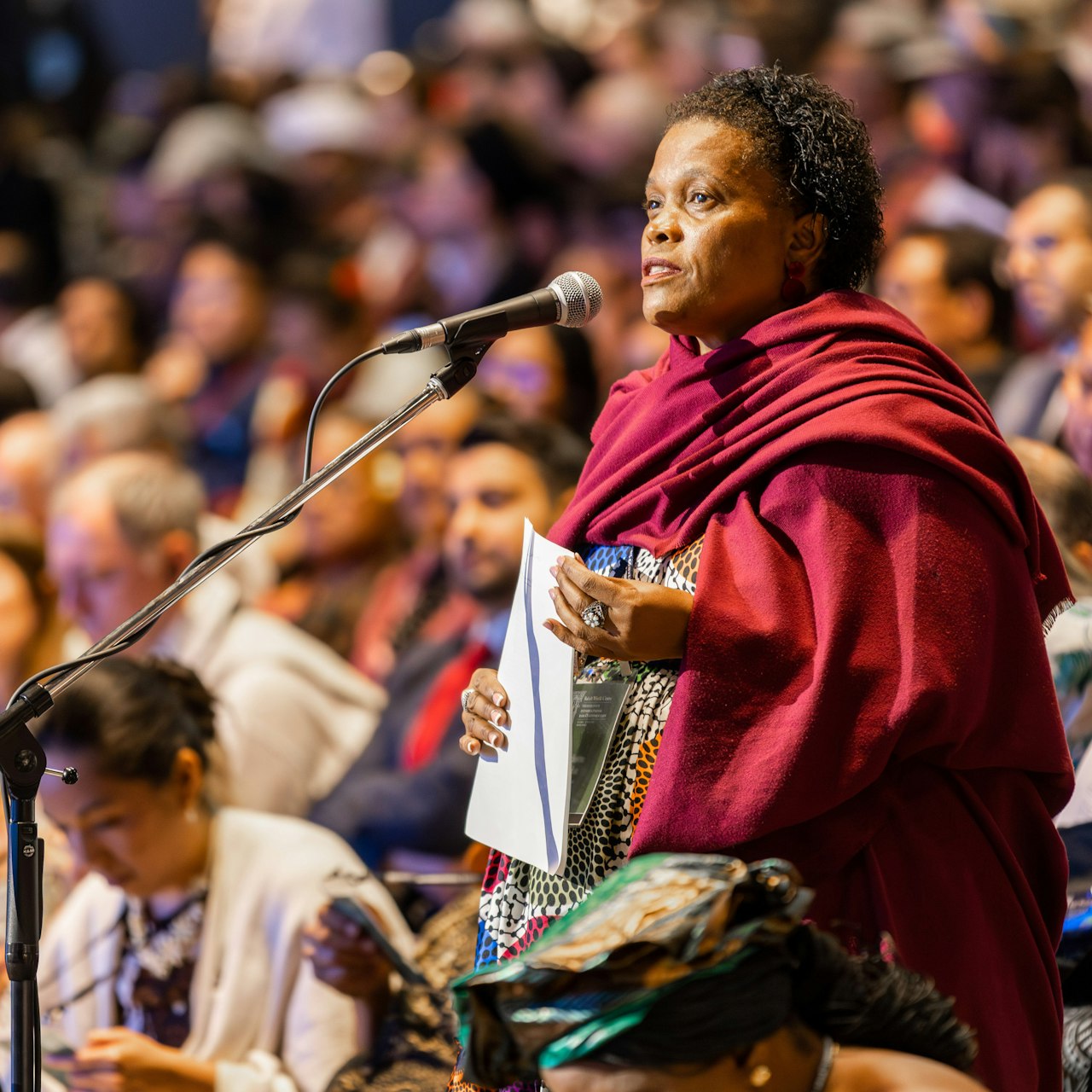BAHÁ’Í WORLD CENTRE — The International Bahá’í Convention drew to a close today, following days of consultation among delegates on the capacity-building process under way in communities around the world to contribute to the spiritual, moral, and material advancement of the societies where they reside.
Tessa Scrine, a member of the Board of Counsellors in Australasia who chaired one of the sessions, said in her opening remarks: “The vision before us has far reaching implications. Each nation whose representatives are gathered here and each of those who cannot be present… is learning to navigate the path of their own development.”
Ramazan Asgarli from Azerbaijan highlighted experiences from a national conference on coexistence held by the government’s State Committee on Religious Associations, which was inspired by discussions with the Bahá’í community on the principle of unity in diversity. “This was our country’s first ever conference about social cohesion,” he said. “From that experience, the government encouraged the holding of many conferences across the country to explore themes such as selfless service as a way to strengthen the fabric of our society.”
Ballakissa Togola, a delegate from Mali, said that many women in her village struggle with literacy. The Bahá'ís’ efforts have focused largely on the advancement of women. “We have been holding devotional gatherings, as well as offering spiritual and moral empowerment programs, which are open to all of the women in the village” she said. “These programs are enabling the participants to improve their literacy skills and some women are themselves becoming facilitators.”
Many of the delegates, some of whom were quite young themselves, emphasized the significance of their work with young people and the profound impact it has on both individual and collective lives.
In a particularly heartwarming and humorous moment, a young delegate from the Caroline Islands took to the podium alongside his Bahá'í children’s class teacher, who serves on the National Spiritual Assembly of the Mariana Islands. The delegate highlighted the crucial role his teacher had played in nurturing his spiritual identity and fostering his commitment to service, illustrating the transformative power of Bahá'í educational programs.
Carmen Rojas of Venezuela spoke about the tireless efforts of young participants in Bahá’í community-building efforts in the face of immense difficulties. “Social and economic challenges have prompted an exodus of people from Venezuela. However, the young people engaged in community-building efforts are less influenced by such forces. They have shown themselves to be discerning protagonists—undertaking social action projects that address needs and choosing to stay in the country to contribute to its future.”
Alexandra Stepanova, a delegate from Moldova, highlighted the power of grassroots initiatives that recently culminated in the establishment of a neighborhood community center. She emphasized that the creative force behind this was the emergence of consultative spaces “which enabled local officials, parents, and the youth themselves to discuss how they could work together to make this vision a reality." As a result of this process, the children and youth have embraced a greater sense of responsibility for the center's upkeep, a centre that will be at the heart of the community’s efforts to work for the betterment of their surroundings.
Numerous attendees recounted the remarkable outcomes that can arise when populations understand the power latent in the training institute and assume responsibility for its growth and development.
Nava Khorram Ahmad, a delegate from Latvia, said that in a country where youth face high levels of alcoholism and drug addiction from a young age, moral empowerment programs offered by the Bahá’í training institute of their community have become “safe spaces”. These educational endeavors, she said, “have assisted young people to take charge of their development. These youth choose a different theme to learn about each month, such as service, health, and friendship, and infuse these social spaces with a sense of calm and peace.” Some of the parents, reflecting on the development they see in their children, are exploring creating similar spaces for themselves.
Judith Watson, from New Zealand, spoke about a region in that country that was devastated by a cyclone. A neighborhood engaged in Bahá’í community-building efforts, she said, was able “to mobilize quickly and effectively…to provide material and spiritual support to families displaced by the cyclone.” She noted that the relationships which had been built over time with the local authorities through these endeavors were essential to more effective collaboration during the crisis. She emphasized that the Bahá’í educational programs “are raising capacity in people to recognize and respond to the needs of their localities.”
Ramón Fumón, a delegate from Uruguay, discussed the increasing ability of local Bahá’í Spiritual Assemblies to inspire and guide the endeavors of the communities they serve. "These local Assemblies are learning to stimulate the development of the capacity of individuals and the community to take charge of their own development." The Assembly’s posture is fortifying the relationships between individuals, communities, and institutions and agencies at the local level, fostering a strong sense of collaboration and mutual support.
Also chairing a session, Sonlla Maria Heern, member of the Board of Counsellors in the Americas, spoke about “a new kind of social actor arising out of the movement of youth engaged in educational endeavors inspired by the Bahá’í teachings.” These youth, she said, are imbued with a strong spiritual identity that better equips them “to withstand the influences of a society in decline and encourages them to become bold and discerning protagonists for social betterment.”



